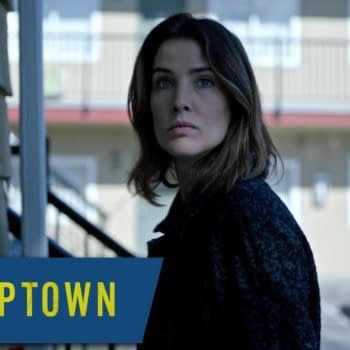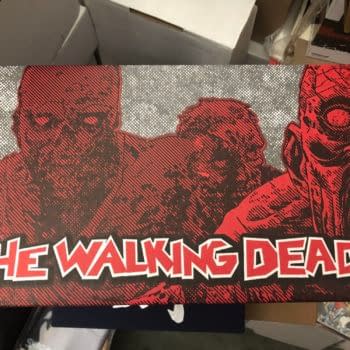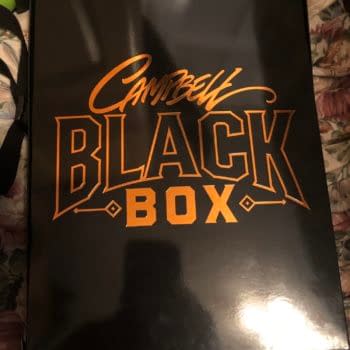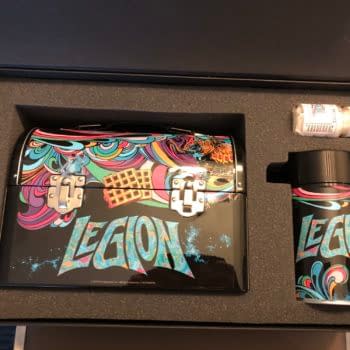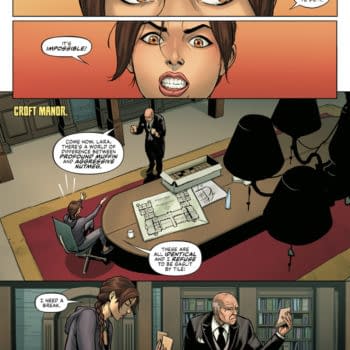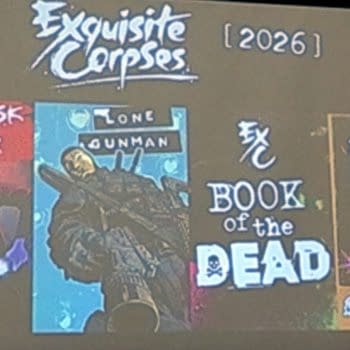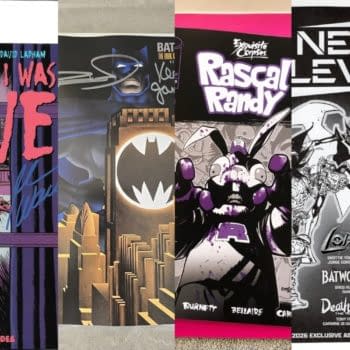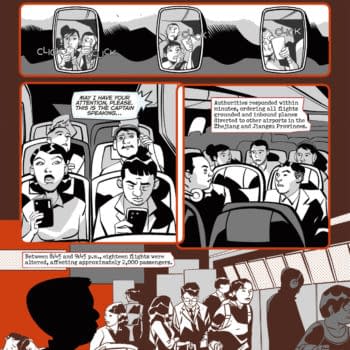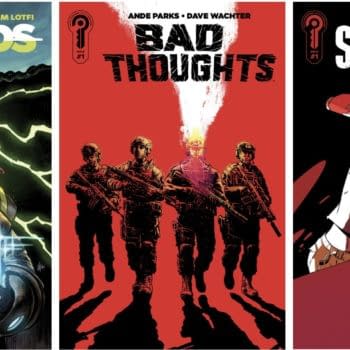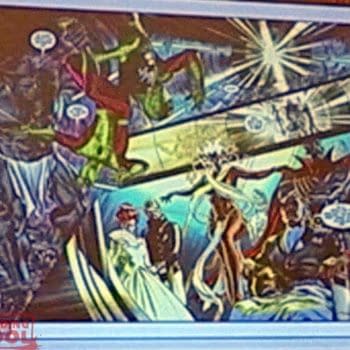Posted in: Comics, Recent Updates, WonderCon | Tagged: boom studios, Brexit, Jonas Goonface, legion, si spurrier, simon spurrier, six gun gorilla, trump, wondercon, x-men legacy
Si Spurrier On Godshaper and Legion: The Most I Can Say… Is That They've Read My Comics And Like Them
When you are doing an interview, the pain in the butt about it is transcribing everything word for word afterwards. To make sure I get everything right that is said, it often means listening to every sentence 4-5 times and sometimes even more. So the longer the interview is, the more time it takes afterwards to actually write it. This can get quite tedious. I spent about twenty minutes interviewing Simon Spurrier, and I think I spent 3-4 hours listening to our conversation over and over again, but I must say it never got tedious. It was a pleasure talking to Simon at the time and a pleasure to listen and relisten to our conservation as I was writing this article. His new book, with artist Jonas Goonface, Godshaper comes out from BOOM! Studios on April 12 at your local comic book store. Having read the first issue I would highly recommend it to everyone, especially if you are looking for something that is different story wise, that is different in the artwork and colorful and beautiful, and that will make you think. A comic book that actually challenges our brains to function is in short supply and is always a welcome thing. Godshaper and Simon Spurrier do that.
Joshua Stone: First off I read Godshaper, and I really enjoyed the book.
Simon Spurrier: Thank you.
JS: Describe the book for my readers.
SS: The short, there is multiple levels of shortness and longness when it comes to this. The short, it's the story about a man without a god and a god without a believer, who are traveling like a pair of tramps across the Midwest of America getting into adventures.
A slightly longer version is that the story takes place in an alternate version of America where in 1958 the laws of physics broke, technology no longer works. There's no combustion, no ignition, no chemical processes. Instead, everyone woke up the morning after to find they were accompanied by their own private god. It takes multiple forms, multiple sizes. Your god is a surrogate for technology. It does stuff you can't do without technology. It's a bodyguard. It becomes a fashion accessory. Everybody is quite vain about their gods.
Most importantly it's your bank account. The bigger your god is the wealthier you are. The smaller your god the poorer you are. In order to buy things, to pay people, you pray to their god, it expands and yours shrinks down a little bit. So there's this whole kind of wonderful weird metaphysical mechanism which controls the world, and as with most of my world building stories that's kind of established and then just set aside, because that's not the story, that's just the world.
The story concerns this guy who is one of the very few people in this world who does not have a god of his own. That makes him a thing that is called a Godshaper. It's like a traveling blacksmith. It's the closest metaphor I can think of, in the sense that he walks up in a town and because he has no god of his own he is able to shape and manipulate other people's gods. He is able to make them look different, change their color, change the sort of power set they have. But he is incapable of owning any wealth and so he is always a pariah. He's on the outside of society. He's almost an outlaw. He's just a lovely guy who's very down on his luck drifting through life. Everywhere he goes everybody wants him but nobody likes him, nobody needs him because he's this pariah. He defines himself according to music. He desperately wants to be a musician because it's the only time he gets to be something more than a man without a god.
His ace in the whole is that he has become friendly with this completely mysterious little god. A cute little guy called Bud, who is probably the only god in the world who has no believer of his own. He shouldn't be able to exist, somehow he does. So when he and our central character, Ennay, when they are together they look like a normal pair. They look like a normal person with their god. They can get by more or less anonymously. And that's the story. They get into weird scrapes along the way. They run afoul of organized crime, they pick up some strays along the way. It's just a really sweet story about belonging and faith and music. It's cool.
JS: Some of the images shown at the BOOM! Studios panel the other day included the great Blues artist Robert Johnson, and the physical design of Ennay seems to come from him. Is the music within the book also the Blues and based around the music of Robert Johnson?
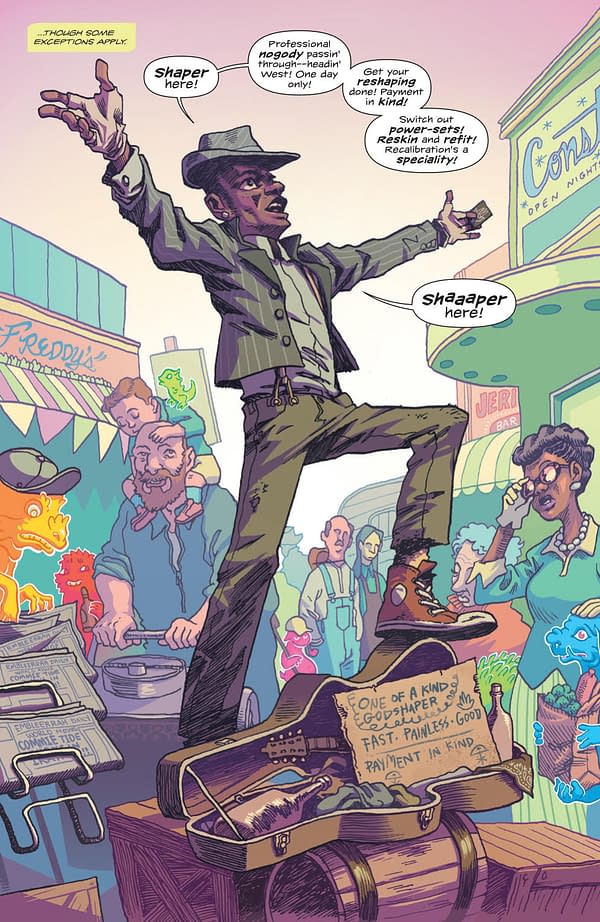
S: A little. It's a question for the artist, Jonas Goonface. It's a wonderful nom de plume. The visual inspiration would be a question for him. When it comes to the music, one of the conceits of this world, because the world changed so radically in 1958, one of the kind of thematic ideas we are playing with is this idea when everything in your world is obsessed around metaphysics, culture and the things that make our lives worth living stagnates. In this world the mainstream of music is this sort of stagnant soft rock, rockabilly, miserable mainstream poppy sort of thing. Whereas Ennay, and his associates, are members of this weirdly vibrant underground, kind of an illegal subculture which they call Cantik. The beauty of doing a musical story in comics is that I don't really need to know what that sounds like. I like the idea that everybody that reads the comic will imagine something different. Is it a little bit jazzy, grungy, poppy? It's about music without gods. Most other people use their gods as their instruments. It's like holy pop, it's tedious. He wants to do something that uses his body and his skill and I have no idea what that sounds like, but it looks amazing. It looks skeevy and divey and sexy and wrong and counter cultural, but also beautiful all at the same time. That's entirely down to the artist.
JS: So Goonface pulled the idea for Robert Johnson and modeling Ennay's look after him all on his own?
SS: I think so. Well, not really, we new what we wanted. The idea of race is sort of an interesting red herring in this story. The idea being, when you have this kind of slave class, this underclass of godless people, things like race cease to be quite as important. So he's a black man, he's actually mixed race but appears to everyone to be a black man, moving through very white middle America but it's not his race that makes him a pariah. We just really don't go near race. I think Jonas leaned into that in a really beautiful way. He sort of embraced the kind of bluegrassy, jazzy, bluesy things that are kind of redolent of that image. A big part of it for him was designing the costume aesthetic of a counterculture that never exists. You start talking about the punks, the kind of greasers, all these different visual cultures that go hand in hand with their musical style. He's ended up creating this beautiful fusion of them all which looks very alien, but also quite familiar all at the same time.
JS: At the BOOM! panel you used the word hobo, today you say tramp, and adding in the Robert Johnson image I was thinking 1930s Depression era and not the 1950s.
SS: I think we can assume the War came and went and then it went straight back into this Dust Bowl mentality after the war. There's an awful lot of influences and it's all in there. You got guys riding trains. Trains pulled by massive gods. Old carriages, very rusty, being pulled by these bloody great monsters.
JS: So there will be train hopping?
SS: There is a little bit of train hopping.
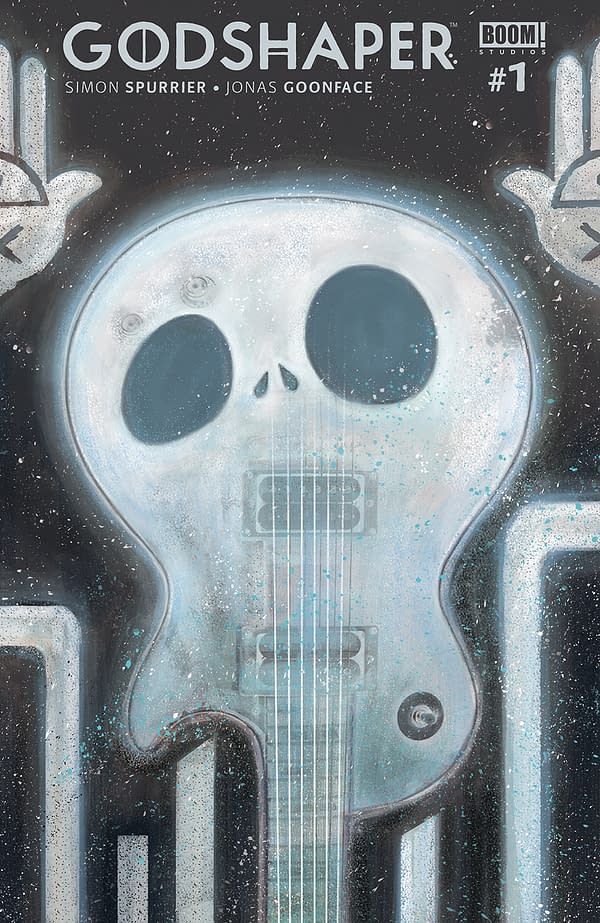
JS: Awesome. So I loved the two double splash pages of the Cantik scenes. What stood out to me is that Ennay has a good time with anyone. So, because everyone has their own personal god, has society moved beyond our world's idea of what sexual norms are because there is no church or religion to say what is not allowed? Or is it just because Ennay is on the outskirts of society instead?
SS: A very, very good question.
JS: Yes!
SS: It's a little of both actually. As I said before, the trick with me is that the world building has to play second fiddle to the story. These are things we will slowly reveal on the sidelines of the story. My instinct is that the world is far more, because everybody has their own god, its this weirdly conservative capitalistic society. Everything is quite greedy, everything is about status. The basic average person is far more keen on the idea of monogamy then they are worried about notions of sexuality. So to them Godshapers are regarded as promiscuous and the problem is their promiscuity not the fact that anybody is into guys or into girls. In Ennay's case I will never go so far to say what has caused him to be as happy go lucky and open minded as he is. Is it because the lifestyle he leads where he is shunned by normal society has caused him to just embrace love and affection wherever he can get it? Or is it something he was born with? I don't want to get into that whole nature nurture thing. For whatever reason, he leads a lonely life and so wherever he finds someone who's going to give him affection he's going to take it and he is going to enjoy himself along the way.
JS: So this my second attempt at a deep question. A read an article this week about farmers in Alabama who supported Trump, who are now losing crops because migrant workers don't come into the country because of Trump's policies. How much does Ennay and the Godshapers fit into the idea of migrant workers and does some of your ideas come from what's happening now in the world?
SS: Another good question. I should add what's going on in my home country at the moment, the Brexit stuff. We are going to have the same thing. It was very, very easy to stir up the fears of white middle class England in the same way white middle class America has been motivated.
JS: I think it's been more of a white lower class. Those who have lost so much with the changes in technology and automation.
SS: Sure. The way I see it, it is a class of people who never realized that they were privileged who has seen their privilege erode and from their perspective is therefore an attack against them. Hobbes, the philosopher, wrote about them. He called them Leviathan. It was the great sleeping Leviathan. The silent majority. It's not a majority at all. It's just angry white people who think they are being attacked, who didn't realize they were sitting on a pedestal to start with. That's what's been mobilized by the present Alt-Right. It's going on in my country, we're sort of severing all our bonds with Europe. Exactly the same thing you just described – farmers who are kind of like oh the EU, it's all about quotas, it's screwing us over. Get rid of the EU. Suddenly no migrant workers. Their crops are dying and no one can afford to harvest anything. With regard to the story it's all in there.
What we are talking about is the necessity in any capitalistic society for there to exist an under trodden servant class. All capitalist societies have one. It is in the interest of those on top of the pile to make sure those people remain dispossessed, disenfranchised. In Godshaper, the really exciting tension for me is that if society was different, the Godshapers would be in charge. They are literally the only people who can reshape, retool, reconfigure other people's gods. This is a position of power, but because society refuses to allow them that power they are instead traveling servants, and that's quite a powerful thought. I think that is true for any servant underclass. Rome had more slaves by a factor of three then it had real people.
JS: It's this idea that "these people" are taking our jobs. Ok, who of you white people who have been complaining, who's going to pick the crops, who's going to do the work? None of you, because you're all too good for it.
SS: Exactly. There's a really interesting thing, we hint at this. I think it is something that I will get into in subsequent arcs for Godshaper, it is hinted that the West is in a perpetual war with the East. Probably the Vietnam Was never ended, it just spilled out and took over, a sort of hemispheric, global war. In a Communist society a Godshaper is in charge, because you are part of the unit, part of the Soviet. You can control things. Again, I have no opinion, nor right to an opinion on which of those two models is better except they are both monstrous in quite different ways. In the West it's the people at the very bottom who get trodden on and in the East it's everybody who gets trodden on in a different degree. It's fascinating stuff using metaphysics as a metaphor for just about anything you care to name.
JS: I loved Six-Gun Gorilla. Any chance of a movie, because I think the right director would make a bat-shit crazy amazing film?
SS: I have no news to give you on that front. It's extraordinary you think that because in my opinion it's one of the least filmable things I've ever done.
JS: People said the same thing about Lord of the Rings.
SS: You would have to change the story probably, but it ends up such a meta-fictional romp though pulp magazines of the 1920s. What I love about that book, it's one of my favorite things, Jeff (Stokely) absolutely blew it out of the park, everyday I come to a show like this and I am standing at the booth, I see people coming by, "What's this? Oh its got a gorilla on the front and a gun. I'm going to buy this." The next day they'll come back and say "That was not what I was expecting at all, but it was awesome." That's really nice to hear. I can see that now you said it, I can see that. That would be a kind of cool movie, right.
JS: Yeah, a gorilla, a gun!
SS: Yeah, it doesn't need much more complexity than that. It's good. Apropos of world building, you start from a position of creating a fascinating, unusual, strange world with its own economy, and then you ignore it in favor of a character who has to navigate their way through it.
JS: I am legally obligated to ask this. I read X-Men Legacy and enjoyed the run. I tried watching one episode of Legion.
SS: Not for you?
JS: I just couldn't…
SS: That's a shame.
JS: Did you watch it? Did you like it? And are you a little bit pissed?
SS: The last one being in the angry sense and not the alcoholic sense?
JS: Yes.
SS: I have watched it. I haven't finished watching. I have hugely enjoyed it so far. Bear in mind I am a horribly over analytical person so I will always focus on the things that don't work rather than the things that do work. So far there's been only one episode that for me was deliberately weird for the sake of weird rather than focusing on a clear through journey. I'm not pissed at all. I think the most I can probably say with certainty is that they've read my comics and like them and used them as a sort of tonal touchstone. They've been quite careful, and I have no problem with this, to not use anything specifically taken from my comic, that's cool. They gave me a credit at the end of episode one, saying thank you to Simon Spurrier. Yeah, I have no complaints. Even if you don't like it, I think it will open the floodgates of a different sort of storytelling which can only be a good thing for tv.
JS: I saw they are coming out with the omnibus of your story very soon.
SS: So one feeds the other quite admirably.
JS: I think the fact is, the David Haller that existed prior to your run on it, if you never did your run on the series, the Legion TV series does not exist.
SS: I think you're right, but that's something that would be arrogant for me to say out loud.
JS: I can say it.
SS: You can say it and I will thank you for saying it.
JS: You're welcome.

SS: I did not create that character, all I did was tell a very personal story about him. And they are clearly telling a very personal story about that character.
For further musings from Joshua Stone, you can follow him on Twitter @1NerdyOne, but it is not required



